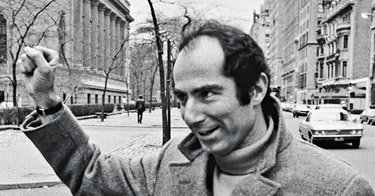Christian Lorentzen, The Vying Animal — The life of Philip Roth and the art of literary survival:
The ways writers used to mythologize themselves have either expired or been discarded as toxic. In the old gallery there were patrician men of letters (Howells, Eliot), abolitionists (Stowe), adventurers (Melville, London, Hemingway), madmen (Poe), shamans (Whitman), aristocrat expatriates (James), bohemian expatriates (Stein, Baldwin, Bishop), playboy expatriates (Fitzgerald), denizens of café society (Wharton), romantic provincials (Cather, Thomas Wolfe), small-town chroniclers (Anderson), country squires (Faulkner), suburban squires (Cheever, Updike), vagabonds (Algren), cranks (Pound), drunks (West, Agee, Berryman), dandies (Capote, Tom Wolfe), decadents (Barnes), butterfly-chasing foreigners (Nabokov), cracked aristocrats (Lowell), recluses of uncertain eccentricity (Salinger, Pynchon, DeLillo), committed radicals (Steinbeck, Rexroth, Wright, Hammett, Hellman, Paley), disabused radicals (Ellison, Mary McCarthy), radicals turned celebrities (Mailer, Sontag), activist women of letters (Morrison), alienated children of immigrants (Bellow), neo-cowboys (Cormac McCarthy), hipsters (Kerouac), junkies (Burroughs), and hippies (Ginsberg). In the end there is only the careerist, the professional writer who is first, last, and only a professional writer. The original and so far ultimate careerist in American literature was Philip Roth.”
HT: JWB.






Please Leave a Comment!